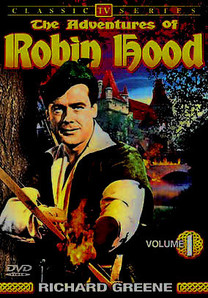|
This was a story that absolutely fascinated me in the current issue of Written By, the in-house magazine of the Writers Guild of America. Every once in a while, the magazine edited by Richard Stayton devotes an issue to a single theme, and this was dedicated to the Blacklist, likely timed for the upcoming movie Trumbo (which I wrote about here) with the film's screenwriter John McNamara on the cover. But it was another article inside that leaped out to me, "A Noble Band of Outlaws," written by David Gritten. The story dealt with a very popular TV series in the late 1950s, The Adventures of Robin Hood. It ran for four seasons and 143 episodes. (Yes, that many in just four years. Back then, a full year was...a full year. Its third season they produced a remarkable 41 episodes.) You may have found childhood memories of the show, or perhaps caught up with it on DVD. It turns out that there was a reason such an early show in TVs Golden Age stood out for many in the audience as so lively and fun -- It was often written by some of the greatest movie screenwriters in Hollywood history! You just didn't know it because they were blacklisted, some on the famous Hollywood 10, and writing under pseudonyms. This is not hyperbole. Among the people who wrote for The Adventures of Robin Hood were -- Ring Lardner, Jr., who wrote the classic Tracy-Hepburn film, Woman of the Year and later, after the Blacklist ended, M*A*S*H. (The article says that he co-wrote the Robin Hood series' first episode, but in checking credits there's a lot of inconsistency. Another source shows that Lardner wrote the premiere episode all his own, as 'Eric Heath' and co-wrote the second episode. And wrote the third and fourth. At the very least, though, he did write for that first show.) Waldo Salt, who was an uncredited contributing writer on the Jimmy Stewart-Katharine Hepburn classic, The Philadelphia Story, and later won Oscars for writing Midnight Cowboy and Coming Home, and also wrote Serpico, The Day of the Locust, The Gang Who Couldn't Shoot Straight and the epic Taras Bulba. Howard Koch, who had won an Academy Award for co-writing Casablanca, as well as writing the Oscar-winning (for Gary Cooper as best actor) Sergeant York and the Errol Flynn classic, The Sea Hawk, as well as after the Blacklist the wonderful TV movie, The Night That Panicked America about the Orson Welles' War of the Worlds radio broadcast. Robert Lees wrote many of Abbott and Costello's most-popular movies, including Buck Privates Come Home, Abbott and Costello Meet Frankenstein, Abbott and Costello Meet the Invisible Man, Hold That Ghost and The Wistful Widow of Wagon Gap. And other Blacklisted writers include Adrian Scott, whose credits include Mr. Lucky with Cary Grant, and Ian McLellan Hunter who wrote A Woman of Distinction with Rosalind Russell and Ray Milland; Mr. District Attorney and Eye Witness. In all, research shows that as many as 22 blacklisted writers wrote episodes for The Adventures of Robin Hood. This largely came about because the show was made in England, financed by Lew Grade (who later became Lord Grade, and whose great-many credits include executive producer of The Muppet Movie and was the inspiration for the studio head played in the film by Orson Welles, as 'Lew Lord.') And overseeing it all was Hannah Weinstein, an American producer who had relocated in London. As the article notes there was logic in her plan to use blacklisted American writers. First, she already knew many of them through her previous political work. Second, the level of talent available was significant. Third, because of their situation, the blacklisted writers were willing to work cheap. And also, many of the blacklisted writers has themselves moved to England and therefore were accessible. You can read the whole article here. The intricate tale and subterfuge is fascinating. It's well-worth checking out the full story. Here's the first episode of The Adventures of Robin Hood. Oddly, the one on-screen credit missing here is the one for (you guessed it) the writer. But writers names do start showing up on the second episode.
2 Comments
12/17/2018 01:18:32 am
I worked for Official films in New York in 1958,9 and was involved in the distribution of the Saphire series in the U.S. and have my own funny story about having my name changed to " S. Lee Gifford" (of the "Virginia Giffords"). I'm starting to write an autobiography and would like to talk to you about Hannah Weinstein and politics of the times. I hope you see this and would care to chat. Sam gelfman
Reply
Robert J Elisberg
12/17/2018 09:24:30 am
Sam, thanks for your note. What might be more valuable is for you to contact Richard Stayton, the editor of the WGA magazine Written By that did the issue.
Reply
Leave a Reply. |
AuthorRobert J. Elisberg is a political commentator, screenwriter, novelist, tech writer and also some other things that I just tend to keep forgetting. Feedspot Badge of Honor
Archives
June 2024
Categories
All
|
|
© Copyright Robert J. Elisberg 2024
|







 RSS Feed
RSS Feed